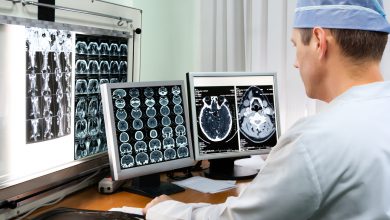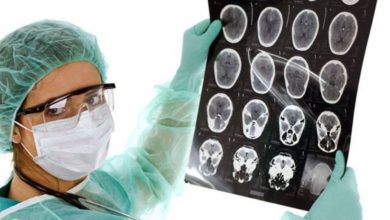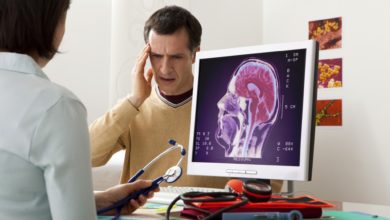Brain cancer, symptoms
The content of the article
It is not at all easy for even experienced specialists to identify such a terrible disease as cancer, since the symptoms are very different, and sometimes a large tumor does not manifest itself in the same way as a small tumor that makes a person suffer. It all depends on the place where the infected cells formed.
For many, a diagnosis of brain cancer means the end of their lives. But as with any other disease, there are nuances that can change a terrible sentence to a normal continuation of life. It all depends on the stage of development, as well as on how advanced the process is.
The main thing to remember is that the sooner a person pays attention to his condition and seeks advice from specialists, the higher his chance of recovery.
In the early stages, any disease can be treated much more effectively, including cancer. Given the skepticism that surrounds doctors' statements about the possibility of curing cancer, such cases are not at all uncommon. Of course, if the disease was not delayed to stage IV, when metastases appeared. But according to the patients themselves, there were exceptional cases of recovery even in these situations.
Brain cancer is a very insidious disease. It is dangerous because it can be asymptomatic or with such signs that do not alert a person until a certain time. According to WHO, 6% of all cancer cases are brain oncology; symptoms at an early stage of the disease are disguised as other pathologies. For example, migraine is very similar in its symptoms to headaches due to tumor processes. Dizziness may be a sign of spinal osteochondrosis, and headaches or changes in the quality of vision may indicate increased blood pressure. In short, it is very difficult to correctly diagnose a tumor process in the early stages, even when the patient consults a doctor. If the patient delays going to the doctor, then in this case there is no possibility of diagnosis, and in the meantime the disease develops.
Classification
Brain tumors are all tumors that form in the skull and spinal canal. They are classified into groups: 1. primary focus, 2. cell composition. According to these two factors, all cases are divided into primary, that is, those that develop from tissues, membranes of the brain and nerves of the skull, and secondary - metastatic. With them, metastases penetrate into the brain from a malignant tumor that has affected other organs.
Cancers are classified depending on histological parameters, that is, on the type of tissue from which the disease develops.
There are many of them, but the most common are the following:
- Neuroepithelial. Such tumors develop from brain cells. Glioma is more often diagnosed . It can be located in any area of the head.
- A tumor that grows from the membranes of the brain and nerves is called meningioma .
- Metastatic. In this case, neoplasms appear from metastases penetrating from other affected organs. In women from the mammary gland, in men from the lungs.
- A disease such as a pituitary adenoma forms when the cells of the brain appendage begin to divide uncontrollably.
As the tumor grows, it increases in size and begins to “put pressure” on the tissue. In this case, it all depends on which department the pathology has spread to.
However, the process cannot be started. Pathology, whatever it is, growing and exerting pressure, causes a person a lot of trouble and over time can lead to irreversible consequences. If left untreated, a benign tumor can develop into a malignant one.
In these cases, metastases may form, which, growing, will affect all tissues. There are “point” tumors that do not grow because their growth is restrained by the bones of the skull.
Causes of the disease
The reasons that can provoke the appearance of cancer have not yet been determined. What is known is that genetic predisposition can influence the process of degeneration of normal cells into cancer cells. Numerous studies show that heredity influences this process.
External reasons are considered:
- radiation;
- carcinogens and chemicals that poison the human body;
- alcohol and smoking;
- age of people. It has been noted that older patients are much more common among the sick than young ones;
- various diseases that reduce immunity provoke the appearance of tumors.
Symptoms
In order to notice the slightest changes in well-being as early as possible, you need to have information about what symptoms of brain cancer generally exist, and what you should pay attention to first.
Headaches can be especially severe during stress or extreme tension. A painful attack may occur when turning the head, and unconsciousness or blurred vision may occur. What should be most alarming is that taking painkillers does not alleviate the condition. But all these manifestations can be in many ways similar to various diseases. Therefore, there is no reason to immediately focus on the diagnosis.
As soon as possible, the patient should contact specialists and conduct a comprehensive diagnosis. This will help to determine as accurately as possible the cause of the body’s poor condition. Signs of head cancer such as nausea or vomiting may indicate increased intracranial pressure. Unless, of course, they are related to drinking or eating. As a rule, vomiting is associated with headache. There are dizzinesses, which may indicate an advanced process of brain damage and the growth of the infected area. Signs of cancer such as epileptic convulsions can occur when different parts of the head are compressed, and their number can increase.
Focal signs
The first signs of brain cancer, one way or another, make themselves felt. This occurs due to the impact of the neoplasm on different parts of the head. When the optic nerves are compressed, the first symptoms of poor vision appear. These symptoms of brain cancer in the early stages appear in the form of floaters or dark spots, flickering in the eyes. In later stages, a person may lose vision completely.
If the tumor touches the auditory nerve, it will cause hearing impairment. Damage to the vagus nerve leads to pressure changes, increased sweating and weakness.
The first signs of impact on the cerebral cortex appear in the form of various disorders and disorders:
- intelligence decreases;
- speech is disrupted;
- memory weakens;
- irritability increases.
The signs of early stage brain cancer are the same in women and men. According to statistics, this disease is not as common as it seems. Brain cancer affects one in five thousand people. In women, according to statistics, brain cancer is detected more often. But, most likely, this is due to the fact that the symptoms that appear in women make them want to go to the doctor and check their condition. Men, as a rule, are less likely to go to the clinic, even because of severe headaches. The signs of head cancer in women are exactly the same as in the stronger half of the population; they occur and are treated in the same way. There are no differences here. The same statistics claim that Europeans, that is, white-skinned people, develop brain cancer much more often than people of other races. What this is connected with is still unknown to science.
Stages of cancer
The onset of the disease is the first and second stages. The tumor is still very small and does not manifest itself in any way due to the fact that it does not put pressure on the brain structures. Cancer can be detected at this stage only by chance during an MRI . A person must immediately begin a radical method of treatment. Under no circumstances should diagnosis and treatment be delayed, as this is life-threatening. The first signs do not begin to appear immediately, and they can be very different. Each person is individual and the disease can give signals that are atypical for a given disease. Most often, manifestations such as cramps or numbness of the arms, legs or other parts of the body are a manifestation of a serious disease. Therefore, if such cases are detected, it is necessary to seek advice from a neurologist. He will definitely prescribe an MRI, which can detect even a small tumor.
Nowadays, many different methods have been developed to carry out diagnostics. But the patient does not always correctly assess his condition. Vision begins to deteriorate, a person goes to an ophthalmologist. And there the doctor will not send him for an MRI, but will simply prescribe glasses, blaming everything on age-related changes. And now the moment when it was possible to begin effective treatment has been missed.
No one associates symptoms such as fatigue and irritability with brain cancer. Meanwhile, these are some of the very first signs of this terrible disease. If all the signs of vegetative-vascular dystonia are present, then it is best to ask the attending physician to prescribe all the necessary types of examination, including MRI and tests. Just to make sure there is no threat to life. Because whatever symptoms appear at the early stage of cancer, the same ones can accompany many other diseases.
How does the disease progress?
If you ignore the symptoms and signs and do not consult a doctor at first, then, after waiting until the third stage, it will be difficult to count on good prognoses.
The focus of the disease grows, compresses the brain structures, and it is impossible to make a mistake with the diagnosis. But at this time, a correct diagnosis will no longer change the situation, since treatment may not be possible. That's the problem. When cancer “comes out of hiding,” as a rule, all the basic functions of a person have already been impaired. What remains is treatment aimed at inhibiting the growth of cancer cells in order to delay the sad outcome as much as possible. The patient’s life expectancy depends on the degree of development of the process, that is, the growth of the cancer tumor. This type of cancer has the ability to destroy the central nervous system.
Special research methods help determine the stage of cancer. It is impossible to diagnose the disease without magnetic resonance imaging. It is information about the stage of the disease that allows specialists to navigate and prescribe the necessary treatment. Four stages of disease development are distinguished in cancer. Brain cancer detected in the early stages - first and second - is different in that it gives a person a chance for recovery if treated correctly. In the first stage, the tumor grows slowly and can be excised surgically. The second stage has a different picture. The tumor, gradually increasing in size, begins to affect some brain structures, which leads to pathological changes in health.
The tumor begins to grow rapidly at the third stage. At this stage, it penetrates more and more into the internal structures of the head, causing irreparable damage to the organs of the nervous system.
Diagnosis of cancer
It is difficult to diagnose this type of oncology due to the fact that this terrible disease is located inside the skull. It cannot be “felt” or examined. A person sees a doctor only when his health suddenly deteriorates. But it is known that the first “bells” appear when the tumor begins to grow and invade various parts of the head.
The rate at which all symptoms develop depends on where the tumor is located. It is on the basis of the identified symptoms that the doctor can determine its location, since the pressure that the tumor exerts on a certain brain structure gives impetus to the manifestation of certain symptoms. If you notice at least a few of the symptoms that have been described, you should go to the doctor as soon as possible. First you need to see a therapist. He will be able to correctly assess the patient’s condition and write out directions for the necessary tests. Then, if necessary, the doctor can refer the patient for further diagnostics to identify oncology.
Methods for examining human reflexes are mandatory for the correct diagnosis of oncological pathologies. Check tactile and pain sensitivity. If there is a suspicion that a tumor is present, the patient is immediately referred for diagnosis using computed tomography or magnetic resonance imaging. These examinations are necessary to make a decision about hospitalization of the patient. Upon admission to a specialized oncology hospital, the patient is once again given all the necessary examinations and tests to confirm the diagnosis and determine further treatment tactics or rule out the presence of the disease and refer the patient to other specialists.
Treatment
Brain cancer is a life-threatening disease. Primarily due to the fact that it is located in a small space inside the human skull. But you should know that even malignant tumors do not always lead to a tragic ending.
This type of oncology can be treated in a timely manner.
Treatment is almost identical for all types of oncology. They use a complex of powerful medications. This method is called chemotherapy, as well as surgery, removing the entire tumor, and radiation. All these methods are almost always used in combination. Surgery to remove a tumor is a complex procedure, especially if it affects parts of the brain that are responsible for vital functions. Unfortunately, the fourth stage is the last, and only involves treatment with special drugs, the effect of which is aimed at reducing symptoms and pain. It is impossible to cure the patient at this stage. Doctors, determining the size of the tumor, its boundaries and exact location, decide on one or another method of treating the patient.
Usually preference is given to complex treatment, that is, a number of medical indications are carried out:
- this is excision of the tumor;
- irradiation;
- chemotherapy and cryotherapy.
Then the effect is assessed, and if appropriate, several more procedures are performed.
Cryotherapy, when the tumor is frozen with liquid nitrogen, and the method of exposure to ultrasound have begun to gain popularity. These procedures have positive reviews from patients and specialists in the relevant field.
At the same time, therapy is carried out in order to alleviate the patient’s condition and relieve pain.
Features of the disease
Fortunately, brain cancer is not the most common cancer. Both women and men are equally susceptible to this disease. The development of this pathology is especially common in people over 50 years of age. It is this category of the population that should be especially attentive to their health and respond to any changes in the state of the body by consulting a doctor for advice. Indeed, despite its rarity compared to other diseases, this disease is insidious and its first symptoms are hardly noticeable in the first stages. Of course, feeling unwell is not always cancer. But every person needs to be attentive to himself.
Unfortunately, there are still no methods that would allow us to identify pathology in the brain at the beginning of the process. If MRI was performed every year, like fluorography, this, of course, would help. But the method is expensive, and not everyone can afford this type of examination. But if we take into account statistical forecasts, then those patients who were given a harsh sentence of “brain cancer” in the early stages survive in 80% of cases. With later presentation and detection of the disease, treatment leads to success in only 40% of patients.
When remission occurs, not all patients manage to fully recover. Impairments in memory, speech, vision, and hearing, as a rule, remain. It happens that convulsive phenomena or epileptic seizures may appear throughout life. A person may also change emotionally, experience apathy or irritation.
In order to minimize the risk of getting cancer, it is necessary to monitor your health. It is imperative to undergo all scheduled examinations. If there are prerequisites for a deterioration in well-being, then they are unplanned. You definitely need to get tested. Traditional treatment for such a terrible disease is ineffective. But with its help prevention so that cancer cells do not have a single chance to ruin a person’s life.
Please rate the article:






Thank you for the article